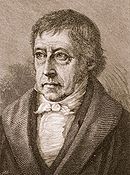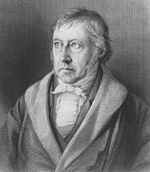- Right Hegelians
-

Part of a series on G. W. F. Hegel People Immanuel Kant
Johann Wolfgang von Goethe
Johann Gottlieb Fichte
Friedrich Hölderlin
Friedrich Schelling
Arthur Schopenhauer
Søren Kierkegaard
Baruch SpinozaWorks Phenomenology of Spirit
Science of Logic
Encyclopedia
Philosophy of Right
Philosophy of HistorySchools Hegelianism
Absolute idealism
British / German idealism
Dialectic
Master-slave dialecticRelated topics Right Hegelians
Young Hegelians
Marx's theory of alienation
The Secret of Hegel Hegel's political philosophy could be read in liberal or conservative directions.
Hegel's political philosophy could be read in liberal or conservative directions.
The Right Hegelians, Old Hegelians, or the Hegelian Right, were those followers of German philosopher Georg Wilhelm Friedrich Hegel in the early 19th century who took his philosophy in a politically and religiously conservative direction. They are typically contrasted with the Young Hegelians, who interpreted Hegel's political philosophy to support innovations in politics or religion.[1]
Hegel's historicism held that both ideas and nations could only be understood by understanding their history. Throughout his life, Hegel was an orthodox member of Prussia's Lutheran Church. He devoted considerable attention to the Absolute, his term for the totality of reality that was used in his philosophy to justify belief in God. In his Philosophy of Right, Hegel wrote that:
The State is absolutely rational inasmuch as it is the actuality of the substantial will which it possesses in the particular self-consciousness once that consciousness has been raised to consciousness of its universality. This substantial unity is an absolute unmoved end in itself, in which freedom comes into its supreme right. On the other hand this final end has supreme right against the individual, whose supreme duty is to be a member of the State.[2]
— Philosophy of Right, "The State", p. 258
The Hegelian right expanded this conception of statism, seizing on it as an affirmation of establishment politics and orthodox religion. Hegel's historicism could be read to affirm the historical inevitability of modern institutions; a nation was an Ideal, existing in Hegelian idealism above and about the people who constituted it. To argue for political change was to attack the Ideal of the national state. The Right Hegelians believed that advanced European societies, as they existed in the first half of the nineteenth century, were the summit of all social development, the product of the historical dialectic that had existed thus far. Most praised the Prussian state, which enjoyed an extensive civil service system, good universities, industrialization, and high employment, as the acme of progress and the incarnation of the Zeitgeist.
Many of the members of the Hegelian right went on to have distinguished careers in public academia or the Lutheran Church. As a school, they were closely associated with the University of Berlin, and held many of the chairs of philosophy and theology there. Generally, the philosophers of the Hegelian right have been neglected; their fame, if not their reputations, has been eclipsed by the Young Hegelians, including Bruno Bauer and Karl Marx. They left their mark chiefly in theology. Their efforts did not have the intended effect of bolstering a sense of the inevitability of faith as a product of history; rather, they pioneered the introduction of higher criticism by demonstrating the influence of an era on the development of Christianity.
Philosophers within the camp of the Hegelian right include:
- Karl Friedrich Göschel
- Georg Andreas Gabler
- Johann Philipp Gabler
- Hermann Friedrich Wilhelm Hinrichs
- Karl Daub
- Heinrich Leo
- Leopold von Henning
- Heinrich Gustav Hotho
Other thinkers or historians who may be included among the Hegelian right, with some reservations, include:
- Johann Karl Friedrich Rosenkranz
- Eduard Gans
- Karl Ludwig Michelet
- Philip Marheineke
- Wilhelm Vatke
- Johann Eduard Erdmann
- Eduard Zeller
- Max Schasler
- Albert Schwegler
References
- ^ Dallmayr, Fred. The Discourse of Modernity: Hegel and Habermas. JSTOR: The Journal of Philosophy, Vol. 84, No. 11, (1987 ), pp. 682-692. JSTOR 2026775.
- ^ Cf. Hegel, Georg H. W. 1821. Philosophy of Right. Trad. S. W. Dyde, 2008. Cosimo, Google Print, p. 133
Wikimedia Foundation. 2010.
